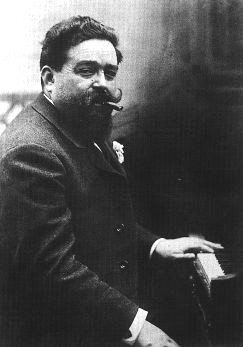Albéniz, Asturias
You may recall my post a couple of years ago on Francisco Tárrega. A prominent composer for classical guitar, he ran away at age 10 to play in restaurants and again at age 13 to join a band of gypsies.
 Tárrega had nothing on Isaac Albéniz (1860-1909). Young Isaac ran away at age 10, then again at age 12, at which point he stowed away on a ship bound for South America. From there he traveled to Cuba, Puerto Rico, and eventually to San Francisco. Still only 13, he got back to Spain, went to London, and then to Leipzig. At age 17 he went to study in Brussels, but took another trip to Cuba and the U.S. He then went to study with Liszt in Weimar and Budapest. After another trip to South America, he finally settled in Barcelona at the ripe old age of 23.
Tárrega had nothing on Isaac Albéniz (1860-1909). Young Isaac ran away at age 10, then again at age 12, at which point he stowed away on a ship bound for South America. From there he traveled to Cuba, Puerto Rico, and eventually to San Francisco. Still only 13, he got back to Spain, went to London, and then to Leipzig. At age 17 he went to study in Brussels, but took another trip to Cuba and the U.S. He then went to study with Liszt in Weimar and Budapest. After another trip to South America, he finally settled in Barcelona at the ripe old age of 23.
His travels were far from over. He moved to Paris to study with Fauré, Debussy, and Dukas and taught piano there. He spent his last years in Nice.
Albéniz devoted much of his efforts to dramatic works, but his operas had little success. His skill as a pianist in the mold of Liszt and the influence of the Paris salons solidified his reputation primarily as a composer of piano works. Spanish influences became a much more important part of his output after 1890.
Asturias first appeared in 1892 as the prelude to a set of piano pieces entitled Chants d’Espagne. It was later published in 1911 as part of the Suite española. Several transcriptions for guitar have been made, most notably by Andrés Segovia.



